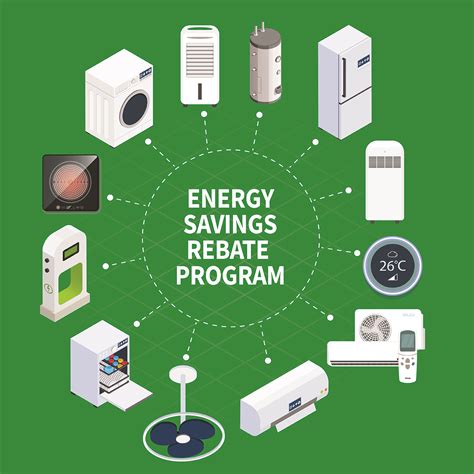Unlocking Savings: New Energy Rebate Programs Announced for Homeowners
In an era where energy efficiency is becoming increasingly crucial, both for saving money and reducing environmental impact, new energy rebate programs have been unveiled that promise to unlock significant savings for homeowners. These initiatives are geared towards encouraging the adoption of energy-efficient systems and practices in residential settings. This article delves into the details of these new programs, their implications for homeowners, and how to take advantage of them.
Understanding Energy Rebate Programs
Energy rebate programs are incentives offered by local, state, or federal governments, as well as utility companies, to encourage homeowners to invest in energy-saving appliances and upgrades. The purpose of these programs is twofold: to reduce overall energy consumption and to help lower utility bills for households.
What’s New in 2023
In 2023, there has been a surge in new rebate programs introduced across various states. These programs focus on a range of energy-saving technologies and practices, including:
- Solar Energy Systems: Homeowners installing solar panels can receive substantial rebates that help offset the initial investment.
- Energy-Efficient Appliances: Rebates are available for replacing old appliances with ENERGY STAR-rated models.
- Home Insulation Upgrades: Programs that incentivize homeowners to improve their home’s insulation for better energy conservation.
- Smart Thermostats: Rebates for smart thermostats that help monitor and manage energy use effectively.
- Heating and Cooling Systems: Incentives for upgrading to high-efficiency HVAC systems.
The Benefits of Participating in Rebate Programs
Engaging in energy rebate programs not only provides immediate financial relief but also fosters long-term savings and benefits:
- Immediate Financial Relief: Reducing upfront costs allows homeowners to adopt energy-efficient technologies that they might not have considered otherwise.
- Lower Utility Bills: Energy-efficient upgrades typically lead to reduced energy consumption, resulting in lower monthly bills.
- Increased Property Value: Homes equipped with energy-efficient technologies may see an increase in market value, which is beneficial for resale.
- Environmental Impact: Reducing energy consumption contributes to a lower carbon footprint, positively impacting the environment.
- Access to Additional Resources: Many rebate programs provide homeowners with access to free energy audits and educational materials about energy conservation.
How to Apply for Energy Rebates
Applying for energy rebates is generally a straightforward process, but the specific steps may vary based on location and the type of rebate. Here’s a step-by-step guide:
- Research Available Programs: Start by identifying the rebate programs available in your area. Websites like the Database of State Incentives for Renewables & Efficiency (DSIRE) can be helpful.
- Determine Eligibility: Carefully read the eligibility requirements for the programs you’re interested in to ensure you meet all criteria.
- Get Professional Assistance: If necessary, consult with energy professionals or contractors who can help ensure compliance with the program’s requirements and maximize rebates.
- Purchase and Install Upgrades: Proceed with the purchase and installation of energy-efficient products as per the guidelines provided by the rebate program.
- Submit Your Application: Complete the application process and submit any required documentation to the administering agency or utility. Keep copies of all receipts and warranties.
- Receive Your Rebate: Once approved, you will receive your rebate, which can be applied toward your next energy bill or refunded directly to your bank account.
Common Challenges and How to Overcome Them
While the introduction of energy rebate programs is a step in the right direction, homeowners may face some challenges:
- Complex Application Processes: Some homeowners might find the application processes cumbersome. It’s advisable to work with energy professionals to navigate the requirements smoothly.
- Uncertainty About Eligibility: Homeowners may not be fully aware of what qualifies for a rebate. Thorough research ensures that you only invest in upgrades that offer rebates.
- Long Wait Times for Rebate Processing: It may take time for rebates to be processed. Keeping all paperwork organized will help manage this delay effectively.
Conclusion
The newly announced energy rebate programs represent a significant opportunity for homeowners looking to save money while improving their energy efficiency. By taking advantage of these incentives, homeowners can make meaningful upgrades to their homes that lead to long-lasting financial advantages and a reduced environmental footprint. As energy costs continue to rise, now is the time to invest in upgrades that will pay dividends in the long run.
FAQs
1. What types of upgrades are eligible for energy rebates?
Eligible upgrades often include solar panels, energy-efficient appliances, home insulation, smart thermostats, and new heating and cooling systems. Check specific program guidelines for precise eligibility.
2. How much can I save with these rebate programs?
Savings can vary widely depending on the type of upgrade and local incentives. Homeowners may save anywhere from a few hundred to several thousand dollars.
3. Are these rebate programs available nationwide?
While many rebate programs exist at the federal level, specific programs may vary by state or utility provider. It is essential to check local offerings.
4. Do I have to wait long to receive my rebate?
Processing times can vary. Some rebates may be processed within a few weeks, while others could take several months. Keeping organized documentation can help speed up the process.
5. Is there any cost associated with applying for a rebate?
Application costs may depend on the service providers you consult or any required energy audits. Generally, the rebate itself should more than offset these initial costs.
Download Energy Rebate Program News
